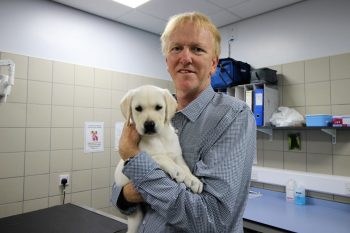Guide Dogs recently started screening our potential stud dogs for the disease Brucella Canis as its prevalence in the UK has increased in recent years. Br. Canis is a rare but serious canine disease more common in other countries, particularly in Eastern Europe. However, because of the influx of dogs from that region into this country over the last few years, there is now considered a very small risk of Br.Canis in dogs within the UK. Brucella Canis is also a zoonotic disease, which means it can pass to humans; although this is extremely rare. Br. Canis spreads via contact with bodily fluids particularly during mating. However, saliva and urine contain low levels of the bacterium.
Br. Canis testing is very complex and the accuracy is around 98 per cent. We have now tested all of our potential stud dogs (80 in total) and two dogs have returned positive tests. These dogs are not nor were they ever working guide dogs. We believe they are false positives because they are in the BSAVA [British Small Animal Veterinary Association] negligible risk category. Nevertheless, we immediately removed them from our programme prior to any breeding taking place and have been following guidance from the BSAVA; advice from our in-house vet team, APHA [The Animal and Plant Health Agency] and the University of Bristol.
The two dogs who we believe to have false positive results have no symptoms but have been cared for with appropriate bio-security measures in place to protect staff and other dogs. Both dogs are being cared for by our expert Dog Health and Wellbeing Team within the Reading Hub which is a self-contained block directly behind the on-site vet facilities. They have large kennels; with runs and paddocks to provide a good environment and a space that is in their best interests. Their wellbeing is not compromised thanks to all the incredible care and work of our staff who have designed enrichments programmes individual to each dog.
We believe our two dogs to be low risk and we are therefore not currently considering euthanasia. Whilst we wait for the expected government guidance, we are continuing to retest and are exploring the option of long-term fostering. We are actively looking for rural fosterers who will have to adhere to a set of requirements to reduce any potential risk. Fosterers would need to live in remote surroundings and not have any other dogs; young children; elderly relatives or immunocompromised people in the home. They would also have to be comfortable with Guide Dogs continuing to monitor and test the dogs to ensure everyone’s safety.
If anyone is interested in finding out more about long-term fostering, or fostering in general, please contact press@guidedogs.org.uk
